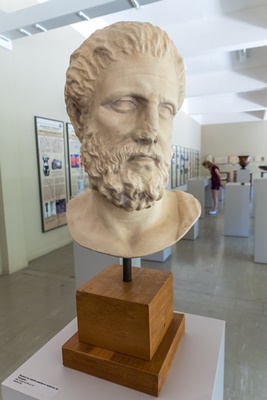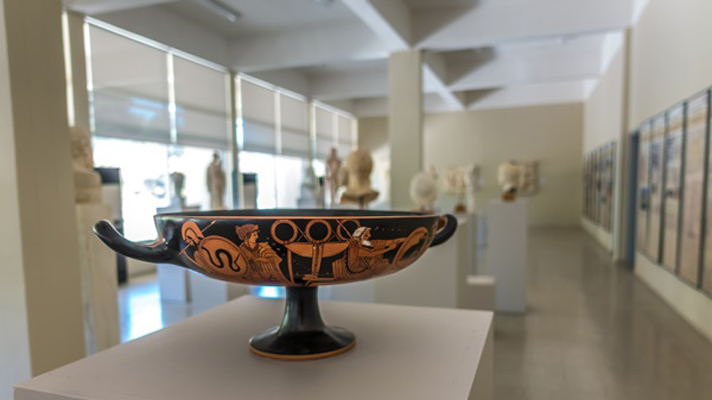Hippocrates of Kos
Hippocrates, Great son of Kos (460-370 BC), the father of Western modern Medicine still apropos to his adviceHippocrates of KosBorn: 460 BC,
KosDied: 370 BC,
LarissaChildren: Thessalus,
DracoParents: Praxitela,
Heraclides Hippocrates -
philosopher, scientist, author, doctor - one of the greatest in a galaxy of great minds of the ancient Greek World, was born on the island of Kos in 460 BC.
His therapeutic methods started with the careful observation of the phenomena of disease, attempting a rational approach to diagnosis. The treatment placed emphasis on the patient and relied on the recovery ability of the human body when placed in the proper environment and supported by the appropriate medicines. When necessary, surgery was applied on external parts, using opium and mandragora as anesthetics. The Hippocratic Philosophy was the first investigation of human anatomy and physiology in ancient Greece. He centered his philosophy upon prognosis rather than diagnosis and he rejected many of the accepted mystical elements of disease. He did not believe that disease was a punishment by God but rather understood that disease arose out of other factors - diet, age, environmental factors.
Hippocrates was practically a contemporary of Plato (429-347 BC) and Aristotle (384-322 BC, who later became the tutor of Alexander the Great) and of some of the great playwrights of Athens. He traveled extensively and offered his services in many Greek cities.
He died in 370 BC, about a decade before the birth of Alexander the Great and the dawn of the Hellenistic era during which the Greek ideas and achievements in mathematics, philosophy, science, literature, architecture, art and politics, along with the Hippocratic rational medicine were spread to the then known world.
Thus, he introduced principles of Science in the therapy of Man's Body and Mind. It is in this respect that, since Roman times, he is considered as the “Father of Medicine”.
Hippocrates became a strong legacy and was the reason behind the creation of the Asclepieion.
The ancestry of Hippocrates is connected to Greek mythology. It is said that he was 20th generation descendant of demigod Hercules (son of Zeus) and 18th generation descendant of demigod - later deified as God of Medicine - Asklepios (son of Apollo). He was thus a descendant of two of the most respected and honored Olympian Gods in the ancient Greek World. Suffice it to point out that the installations of the Olympic Games in Ancient Olympia were dedicated to Zeus, while the Oracle Place in Delphi was a shrine of Apollo.
Through its
Asclepieion, Kos succeeded in achieving a special kind of influence over political powers like Athens, the Greek Empire of Alexander the Great and his successors, and the Roman Empire, by sending Koan doctors to all cities and states that needed them.
Hippocrates through the ages: A Legacy for 2500 yearsIn the dawn of the 21
st century, in today’s turbulent environment, Hippocrates’ views continue to influence the practice of everyday medicine and define its ethical boundaries. In a way that no one else will ever be able to attain.
Asclepieion: The sanctuary of AsclepiosThe Asclepieion of Kos, whose surviving ruins are dated to the 4th century B.C, is located 3.4 kilometers northwest of the city. It is built upon the slopes of a hill clothed in lush flora and graced with beautiful views of the sea. It is the most important monument on the island and of the most important temples of its kind of antiquity. In the ancient times it was the place of worship of the god Asclepius, healing grounds for the ill and a school for the study of medicine. Hippocrates, one of the greatest exemplars of the medical profession taught in the school that he instituted within the sanctuary's area. In contrast to the more arcane sanctum of Asclepius in Epidaurus, its counterpart in Kos Island cultivated scientific medicine.
Koullias Hotels supports the International Hippocratic Foundation of Kos,
http://hippocraticfoundation.org/ and sponsors the development and maintenance of the famous Hippocrates botanical garden. We also commit to raising awareness and to encourage visits to the Museum and the Botanical Garden. It aims to share the inspiration, knowledge, value,s and approach of Hippocrates, “Father of Western Medicine” on health and well-being for over 2.500 years.
We’re sharing some of HIPPOCRATES quotes so we can all benefit from his wisdom and his philosophies: | "Walking is the man's best medicine" |
| “If you are in a bad mood go for a walk. If you are still in a bad mood, go for another walk.” |
| “Your foods shall be your ‘remedies’ and your ‘remedies’ shall be your foods.” |
| “Everything in excess is opposed by nature.” |
| “Natural forces within us are the true healers of disease.” |






